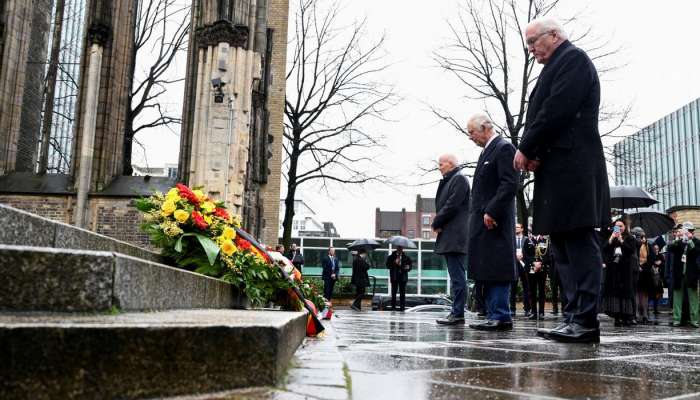
Hamburg: The UK monarch laid a wreath in memory of the victims of the allied bombing in World War Two on a visit to Hamburg's St Nikolai memorial — the remains of a church severely damaged by air raids on the city.
King Charles' visit to Hamburg — the last part of his three-day tour of Germany — came just ahead of the 80th anniversary of the allied bombing of Hamburg in July 1943, known as "Operation Gomorrah."
What was the significance of the wreath-laying?
The move was hailed as an important symbol by some commentators and is unprecedented for a British monarch.
Before the ceremony, Germany's mass-circulation daily newspaper Bild said Charles' gesture at the memorial would "say more than any speech."
The king stood for a moment with his head bowed after laying the wreath alongside German President Frank-Walter Steinmeier and Hamburg mayor Peter Tschentscher. His wife, Queen Consort Camilla, placed a white rose at the memorial.
On a 1992 visit to Dresden by Charles's late mother, Queen Elizabeth II, had eggs thrown at her when she failed to get out of her car to lay a wreath at the rubble of the Frauenkirche — that city's symbol of wartime destruction.
The suffering of German civilians in World War II is a historically and politically thorny issue in Germany itself. The shame of the Holocaust and other acts of tyranny in Germany's Nazi past means that most in the country shy away from discussing the wartime suffering of Germans. In addition, the far-right often evokes the memory of the bombings.
A response to Nazi bombardments
Operation Gomorrah came in response to Nazi air raids on civilian targets in Poland and later London. The St Nikolai church tower was originally designed by English architect George Gilbert Scott and was used as a landmark for US and British bomber pilots to carry out raids. It was left in its ruined state and is now home to a memorial and museum.
During the war, allied bombers unloaded some 1.9 million metric tons of bombs on Germany aimed at crippling industry, terrorizing the population, and forcing a surrender.
The raids — among the most controversial actions taken by the allies — killed some 500,000 people across the country. Unexploded bombs are still being discovered to this day.
Hamburg's mayor had earlier welcomed the royal couple on the platform as they arrived from Berlin at the city's Dammtor railway station. There, the king paid his respects at a memorial to the Kindertransport, a rescue mission in which some 10,000 Jewish children were taken to safety from Nazi-occupied Europe in the late 1930s, mostly to the UK.
"Heeding the lessons of the past is our sacred responsibility, but it can only be fully discharged through a commitment to our shared future," the monarch said in a bilingual address to Germany's lower house of parliament, the Bundestag on Thursday.
Visit to Hamburg port
King Charles — a keen environmental enthusiast — later took a tour of Hamburg harbor to see see how the port is adopting green technologies and to meet representatives of some of the firms involved.
In preparation for the decarbonization of its maritime economy, Hamburg — Germany's largest port — is planning an electrolysis plant with a capacity of at least 100 megawatts, fed by electricity from wind and solar energy.
Designed to strengthen bilateral and European ties, the trip is the king's first overseas state tour since ascending the British throne after the death of his mother last year.
The monarch had originally planned to visit France as his first stop, but anti-government protests there led both London and Berlin to postpone that leg of the tour.